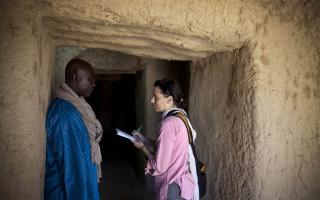Leadership Skills for Programme Support and Administrative Functions
Aligned with UN 2.0, this course empowers general service, programme support, and administrative professionals to apply the UN System Leadership Framework, strengthening their ability to lead, decide, and communicate effectively. Leadership can and should be exercised not only by formally designated managers but by all staff - at all levels, in all functions, and in all locations.
The 2030 Agenda challenges the United Nations (UN) system to change the way it does business. This requires transforming the organisational culture through an ambitious approach known as the "Quintet of Change", a core component of UN 2.0. The "Quintet of Change" emphasises data, digital transformation, innovation, strategic foresight, and behavioural science, all essential to driving a more agile, responsive, and impactful UN.
The UN System Leadership Framework, adopted by the Chief Executives Board in 2016 and embraced by the Secretary-General in his report on management reforms of the UN Secretariat, provides the blueprint for the desired UN organisational culture and the underpinning leadership characteristics. Because leadership can and should be exercised not only by formally designated leaders but by all staff, the framework - alongside the "Quintet of Change" - applies to UN staff at all levels, in all functions, and in all locations.
Upon successful completion of this course, participants will be able to:
- Discuss the practical application of the UN System Leadership Framework for programme support and administrative services.
- Explain the characteristics of UN Leadership – norm-based, principled, inclusive, accountable, multidimensional, transformational, collaborative, and self-applied.
- Apply systems thinking for administrative efficiency in implementing the UN System Leadership Framework.
- Focus on impact and accountability.
- Develop self-leadership skills.
- Enable and support change.
- Apply the design-thinking approach.
- Support transformational change.
This course includes three online webinars over five weeks and a 3.5-day face-to-face session. It combines webinars, self-paced activities on the UNSSC learning platform, and hands-on workshops. It engages participants in practical exercises and group work, case studies and best practices to apply the UN System Leadership Framework to real-life situations.
PART I:
The online part is composed of both synchronous and asynchronous activities. The synchronous elements include three instructor-led webinars on Zoom over five weeks, facilitated by a course instructor. These sessions take place every other week from 2:00 p.m. to 4:00 p.m. (CET) and provide opportunities for direct interaction, discussion, and guided learning. Participants need a computer (or mobile device), a reliable internet connection, and a headset with a microphone or telephone connection for audio. We recommend using computer audio for optimal sound quality. No special software is required, but participants must be able to access Zoom. Instructions for access will be sent to registered participants, and we recommend testing access in advance.
The asynchronous components include self-paced study, discussion forums, and group activities on the UNSSC learning platform. These elements are available throughout the course, allowing participants to engage with content and peers at their own pace while respecting the overall course timeline. On average, participants should plan to dedicate at least two hours per week for self-paced learning, assignments, and course activities on the platform. The exact amount of time may vary depending on individual learning styles and engagement preferences.
PART II:
Participants will attend a 3.5-day face-to-face session to complement learned skills, practice and receive feedback from peers and the instructor.
The course covers the following topics:
PART I (3 online sessions spread over 5 weeks):
- Week 1: UN System Leadership Framework – New ways of working for the 2030 Agenda
This session focuses on understanding the characteristics of UN Leadership which are norm-based, principled, inclusive, accountable, multidimensional, transformational, collaborative and self-applied.
It also covers the four key ways in which leadership behaviours manifest themselves in support of the 2030 Agenda. These include Focus on Impact; Driving Transformational Change; Systems Thinking; and Co-creation.
Leadership also means being accountable and results-driven - taking responsibility and ownership for decisions, actions, and outcomes, while ensuring integrity in how results are achieved.
- Week 3: Leadership Charisma: Emotional Intelligence and Leadership Behaviour
This session focuses on operationalising the universal leadership characteristics, behaviours, principles, and mindsets envisioned in the UN System Leadership Framework. It explores the role of emotional intelligence in leadership effectiveness, self-leadership, and self-management, and highlights how the way we deal with our emotions shapes our actions, careers, relationships, health, and overall well-being.
- Week 5: Leadership and Systems Thinking - Leadership Culture
This session explores how systems thinking underpins the creation of a leadership culture across the organisation. Thinking in terms of systems equips people with the ability to understand complexity, identify leverage points, and drive change where it is most needed.
PART II (3.5-day face-to-face)
The face-to-face workshop is designed to take participants through hands-on exercises and case studies. These will enable them to put into practice what they have learned in the online sessions, likewise, developing their leadership capacity.
UN general service programme support and administrative professionals and personnel of UN partner organisations.
This course can also be run as in-house/on-site training for an individual agency on demand – please get in touch with us for additional details and pricing.
The course fee of $2,200 covers full participation in both the online and face-to-face components. The fee does not cover eventual costs related to participants' travel, board and lodging.




